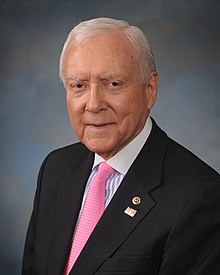Orrin G. Hatch

The International Center for Law and Religion studies is honored to announce that Senator Orrin Hatch has joined the Center as a Senior Fellow. Senator Hatch represented the State of Utah in the Senate for 42 years. First elected in 1976, Senator Hatch was at the time of his retirement in 2019 the longest-serving Republican U.S. Senator in history. He served as either the Chair or ranking minority member of the Senate Judiciary Committee from 1993 to 2005. He chaired the Senate Committee on Health, Education, Labor, and Pensions from 1981 to 1987. Hatch also served as Chairman of the Senate Finance Committee. On January 3, 2015, after the 114th United States Congress was sworn in, Hatch became President pro tempore of the Senate. On January 2, 2018, he announced that he would retire from the Senate. Notable among the achievements of his tenure was his commitment to religious freedom. He co-sponsored the Religious Freedom Restoration Act, the most important religious freedom legislation in the history of the United States, passed by a nearly unanimous Congress in 1993. He was the principal author of the Religious Land Use and Institutionalized Persons Act, which protected all religions’ right to build church facilities on private property, enacted into law by President Bill Clinton in September 2000. In 2010, Senator Hatch defended the right of a private organization to build a mosque on private property in downtown Manhattan, citing this law and defense of the freedom of religion.
From Senator Hatch’s Encylopedia Britannica entry:
Hatch, a membe of The Church of Jesus Christ of Latter-day Saints, earned a bachelor’s degree from Brigham Young University (1959) and a law degree from the University of Pittsburgh (1962). During this time he married, and he and his wife, Elaine, later had six children. He worked as a lawyer in Pittsburgh from 1963 to 1969, when he relocated his practice to Salt Lake City, Utah. In 1977 he was elected to the Senate, where he was consistently recognized as a crusader for conservative values. In the wake of Roe v. Wade (1973), the U.S. Supreme Court decision that legalized abortion in the United States, he proposed in 1977 an amendment to the U.S. Constitution that would have made abortion illegal. In 1978 he helped to defeat the proposed Labor Law Reform Act, which would have expanded the power of labour unions. Five years later he voted against the Equal Rights Amendment (ERA), a proposed amendment to the Constitution that would have invalidated state and federal laws that discriminate on the basis of sex. Hatch cosponsored the Missing Children Act (1982), which established the National Center for Missing and Exploited Children, as well as the Comprehensive Smoking Education Act (1984), which required that cigarette packaging carry warnings from the surgeon general about the dangers of smoking.
Throughout the 1990s and into the 21st century, Hatch continued to serve as a powerful voice for conservatives. He voted in favour of the Religious Freedom Restoration Act (1993), which would have prohibited the federal government from placing a substantial “burden [on] a person’s exercise of religion” in all but a few exceptional circumstances. The law, however, was struck down by the Supreme Court in 1997. Hatch announced in 1999 that he would run for the Republican nomination for the presidency, but he dropped out of the race after several disappointing primary finishes behind front-runner George W. Bush. After the September 11 attacks in 2001, Hatch helped to draft the controversial USA PATRIOT Act, which gave the federal government broader search-and-surveillance powers for use in preventing acts of terrorism. In 2006, as in previous years, he worked for passage by the Senate of a proposed constitutional amendment that would make it illegal to burn the American flag, but it failed by one vote. He also worked to set restrictions on class-action lawsuits and to curb medical malpractice suits, sponsoring bills to that effect in 2004 and 2009, respectively. In addition, he was a vocal critic of the Patient Protection and Affordable Care Act (2010). Fiscally, Hatch supported tax cuts and was a proponent of a balanced-budget amendment.
Despite his ardent conservatism, Hatch occasionally voted in favour of legislation sponsored or supported by Democrats. In 1988, for example, he was the only Republican to support federal funding of AIDS education. Two years later he voted for the Ryan White Comprehensive AIDS Resources Emergency Act (1990), which allocated more than $4 billion to address the crisis on a national level. Hatch was also involved in various bipartisan efforts concerning immigration reform, and in 2001 he and Democrat Dick Durbin helped formulate the DREAM (Development, Relief, and Education for Alien Minors) Act, dedicated to setting undocumented students on a path to U.S. citizenship. Also in 2001 he became one of the few Republican advocates of stem cell research, and he praised Democratic Pres. Barack Obama for lifting the ban on federal funding of stem cell research in 2009. Hatch was often criticized within his party for the close friendship he maintained with Democratic Sen. Ted Kennedy.
Hatch later became one of the Senate’s most vocal supporters of Republican Pres. Donald Trump, and in 2017 he played a key role in fulfilling one of Trump’s campaign pledges: tax reform. Hatch cowrote a sweeping—and highly contentious—tax-overhaul bill and helped oversee its passage in December 2017. The legislation was regarded as a capstone to his career, and in January 2018 Hatch announced that he would not seek reelection later that year.
An author and composer, Hatch wrote Square Peg: Confessions of a Citizen Senator (2002). In 2018 he was awarded the Presidential Medal of Freedom.